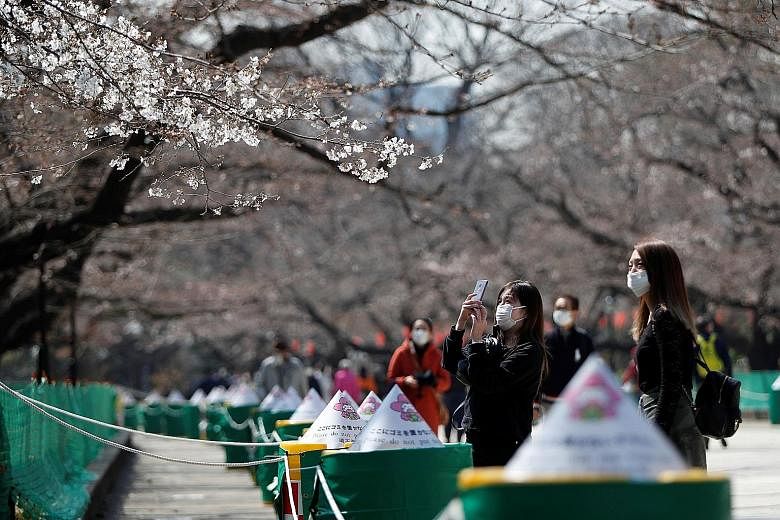Arrivals in Japan were down by 58.3 per cent last month compared with a year ago, Japan National Tourism Organisation data showed yesterday, as the coronavirus pandemic stopped many foreign tourists from visiting the country.
Foreign visitor numbers fell for the fifth consecutive month, down to 1.09 million. However, the worst is yet to come as countries worldwide begin imposing wider travel restrictions this month, in order to fight the Covid-19 outbreak.
In the single largest plunge, arrivals from China were down by 87.9 per cent, followed by arrivals from South Korea declining by 79.9 per cent. Arrivals from Singapore fell by 24.9 per cent.
Japan's goal of attracting 40 million foreign visitors this year appears increasingly out of reach, with growing uncertainty regarding whether the Tokyo Olympic Games will take place as planned in July and August.
Deputy Prime Minister Taro Aso called the Games "cursed", noting that extraordinary circumstances overshadow the Games every 40 years. The 1940 Tokyo Games were cancelled due to World War II, while the 1980 Moscow Games were boycotted by 65 nations, including China and the US.
The coronavirus outbreak has left the aviation, hospitality and food and beverage industries reeling from their losses.
A tally by public broadcaster NHK showed Japan had registered 956 cases of Covid-19 as of yesterday, with 33 deaths.
While foreign visitor numbers are on the decline, appetite for domestic travel has also been on the wane as local governments urged their citizens to stay home.
Both All Nippon Airways (ANA) and Japan Airlines (JAL) have said they will cancel more domestic flights as demand dries up. ANA will cancel 1,360 flights on 42 domestic routes from today until March 31, and JAL will cancel 1,468 flights on 60 domestic routes between today and March 28.
Tourist sites that used to be overrun with visitors, like Kyoto's Arashiyama bamboo forest, have now launched campaigns trying to woo visitors back.
Tokyo trains, however, are still packed at rush hour and popular areas like Shibuya remain crowded, although a majority of those who go out put on masks.
-
87.9%
Drop in arrivals from China.
79.9%
Drop in arrivals from South Korea.
24.9%
Drop in arrivals from Singapore.
Japan has been screening for Covid-19 cases at a fraction of its testing capacity.
With a three-day weekend starting today and cherry blossoms forecast to be in full bloom in Tokyo, the country's seriousness regarding "social distancing" will be assessed.
Hanami (cherry blossom viewing) picnics and gatherings are traditionally popular, although some of the most visited areas, including Ueno Park and Nakameguro, have called off their annual festivals.
Hokkaido Governor Naomichi Suzuki yesterday lifted the three-week state of emergency declared on Feb 28, but urged residents to continue staying at home, saying that present risks are now "under a certain level of control".
There were 157 confirmed coronavirus cases in Hokkaido as of yesterday, with six deaths.
Businesses in Niseko, a town popular among winter sports enthusiasts, remain quite empty.
Singaporean restaurateur Willin Low, who runs an eatery called Roketto, told The Straits Times he was forced to close it three weeks ahead of schedule.
Mr Low, whose 30-seat restaurant serves up dishes such as laksa cooked in snow crab broth, said "at the worst (point) I only served seven bowls (the whole) day".
In Tokyo, the five-star Keio Plaza Hotel has also suffered a steep decline in customers. Public relations manager Keiko Kawashima told The Straits Times the occupancy rate last month plunged 34 per cent from a year ago.
"About three-quarters of our guests are foreigners, but domestic demand has also been declining, with a series of cancellations for events," Ms Kawashima said, adding that the hotel has gone ahead with its cherry blossom event to make it more enjoyable for guests despite the situation.
"I think the impact is going to be far greater, but because there is still no end in sight, it is impossible to predict how bad we will be affected," she said.











